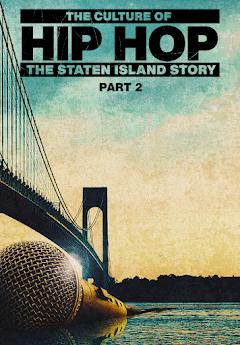
Carl June is a producer. He produced and co funded the production documentary "The Culture Of Hip Hop: The Staten Island Story".
Why did you feel that telling this story was important?
Basically, I'm from Staten Island. My partner Lu is from Staten Island, so a lot of people don't know about the different artists that came out of Staten Island. So, as a filmmaker, we took it personally to actually bring it to the big screen so we could reach United States and worldwide with this documentary.
What did you like about producing this documentary?
I like, you know what? Just getting an interview together and just actually making a story happen and everything, because it's myself and my partner, Lu, we’re like the one-two punch, where we did the editing, the filming, every aspect of it. So, it’s just putting it all together. I think that was a favorite part, where it's a three part series and just putting everybody's stories together and making a three part series that makes sense.
Did you encounter any challenges while doing this, and what were they?
Yes, of course, yes. The challenge was as an independent company trying to convince certain artists that we would like to interview, you know, since it's myself and Luis, budget wise, so we did everything out our pockets and everything. So, just the process of just actually getting everybody together on board that this is something that needed to be told and everything. But, like anything in this world, it takes a lot of hard work to complete, so no regrets.
Do you have a favorite moment from the documentary?
You know what? I definitely like near the end of it, because near the end of the documentary, at that time, it was the 50 year anniversary of hip hop. So, we had opportunity to be at some stage show looking at some of the old school artists and everything performed. So I think, you know, that was very inspiring to us. 50 years later, hip hop is still around.
Was it easy to get people to appear in this documentary?
You know what? As the word started going around, people started talking about it, then it became - in the beginning, of course, it was pretty tough getting a lot of artists, but once we started developing it, also word of mouth, we started leaking some sneak previews and everything, that's when we started getting people like, “Okay, you know what? I want to participate with this documentary.”
How did you guys decide what to cover?
Well, we decided we wanted to go as a timeline. We wanted to start from the 80s with the Force MDs, and pretty much go on to the present time of hip hop. We wanted…the documentary to be a stamp in time about hip hop.
What sort of budget were you working with, and how long did it take to film?
It actually took about four years, and the budget was myself and my partner, where whatever thing that needed to be done, we actually went out and made it happen. From the cameras, to the lights, we already had this equipment already, but we did editing, color correction. You know, we actually do that type of stuff. So, it was just pretty much we wanted to get this project done and everything. So, it was like, whatever money we put towards it, that was the budget, and we didn't even keep track of it. [It] was just for the love, just to make something happen.
Do you know how this documentary got funded?
Yes, between myself and my partner Luis, we funded the whole documentary.
What other screen productions have you been involved in?
Well, about five years ago, we actually did the Iran Barkley story, and it's actually on Amazon at this time. So, we did that about about six years ago, and it's actually still showing on Amazon at this point.
What projects would you like to work on in the future?
You know what? We definitely are big sci-fi guys. So, I could see us in the future working on like a sci-fi project, like a trilogy, something like a Star Wars, because, like you said, once the budget comes in, I think we're ready to handle all different sorts of projects.
Index > Carl June Interview
